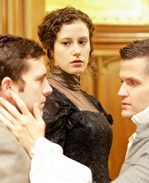SITE GUIDE
SEARCH
REVIEWS
REVIEW ARCHIVES
ADVERTISING AT CURTAINUP
FEATURES
NEWS
Etcetera and
Short Term Listings
LISTINGS
Broadway
Off-Broadway
NYC Restaurants
BOOKS and CDs
OTHER PLACES
Berkshires
London
California
New Jersey
DC
Connecticut
Philadelphia
Elsewhere
QUOTES
TKTS
PLAYWRIGHTS' ALBUMS
LETTERS TO EDITOR
FILM
LINKS
MISCELLANEOUS
Free Updates
Masthead
A CurtainUp Review
The Last Castrato
|
Did they rouse him out of bed as they did me? I was only nine. Did they press on his jugular to render him insensible? So he couldn't cry out? Did they place him in a bath of warm water to 'soften his parts?' I hear him scream in his sleep. He lives it nightly the way I do. Nightly. The way we all
do. For what? To build a machine meant for singing, and nothing more. A human machine. —Alessandro Moreschi
|

L to R: Jacob Pinion (Moreschi), Melissa Miller (Lillie), Doug Kreeger (Cesari),
(Photo: Ashley Anderson) |
Sexual identity, homophobia, bureaucracy, and ambition, all are current news headlines and all are part of the Vatican's medieval intrigue in the Gap in the Wall Production of The Last Castrato. This first staged full-length play by Guy Fredrick Glass is based on the story of Alessandro Moreschi, the only castrato who recorded his voice.
Castrati were prevalent in Italy during the 17th and 18th century when women were banned from church choirs and opera. To acquire the female voice, a barbaric practice arose of castrating young boys before puberty, hopefully resulting in a high but powerful and fluid adult voice. Few boys, however, became proficient Vatican singers, but those who did were superstars, performing in salons around Europe and commanding fat fees. Of course, the downside was that they could not procreate, although some could function sexually.
The Last Castrato, now at the Connelly Theater, takes place from 1903 to 1904, as the castrati's time at the Vatican was growing short. Alessandro Moreschi is well known as "l'Angelo di Roma" (The Angel of Rome) when aging Pope Leo XIII invites him to sing in the Papal Choir. The problem is that the Pope is dying and his probable successor, Cardinal Sarto (Liam Torres), aided by his confidante, Perosi (Jonathan TIndle), is a fierce conservative, determined to ban all castrati. Moreschi's advocate at the Vatican is the joint choir director, Mustafa (Frank Anderson) who's himself a castrato and under political pressure. Moreschi is also befriended by another singer, Cesari (Doug Kreeger), but finds Cesari's open sexuality and fearlessness confusingi. At one point, these two share a kiss, an infraction that leads to Cesari's banishment from the Vatican.
Other secondary characters include two traveling American widows who come to visit Moreschi. Wealthy, dithering, expatriate, Mrs. Charles Astor Bristed (Bethe B. Austin), newly converted to Catholicism, wants to hire him to sing at one of her soirées. With her is a former singer named, Lillie de Hegermann-Lindencrone (Melissa Miller), who wants Moreschi to teach her to sing again. He agrees to give her lessons. While this leads to a close friendship it also stirs up Moreschi's confusion about his sexuality. That confusion is nothing compared to the fear that the political temperature will rise and interfere with the singing that he loves.
As Moreschi declares that he wants only to sing and he is "a machine custom built for singing, and nothing more". Ironically, it is a machine custom built for recording that turns Moreschi's lfe around.
After Pope Leo XIII dies, Cardinal Sarto becomes Pope Pius X and recites an edict stating, "No more polkas, no more mazurkas, no more waltzes.". There are also to be no more castrati. As the Pope states, "Their time has come and gone. They will sing no more!"
Banned by the Pope's edict castrati may be but when the developer of the gramophone arrived at the Vatican to record the choir he also secretly records Moreschi. When Moreschi hears his own voice, he is overwhelmed. "That is the greatest performance of anything I ever heard. Oh, now I understand why I am Alessandro Moreschi indeed!. There will be no more. . ..intimidation!. . ..I will fly! I will be free! . . .I am free!"
Six months later, the new Pope changes his mind and declares "allowing those recordings of the Choir was a step in the right direction. The sales figures for our first batch of gramophone records have come in. And the numbers are truly staggering. Good show. You have given even that fellow Caruso a run for his money." His aide Perosi is less pleased. "So that's what this is all about. Money! And for daring to record popular ditties, with the imprimatur of the Vatican!" But Moreschi is free to record and to sing. He is named joint director of the Vatican Choir.
Director John Henry Davis kept a controlled vision in portraying the complexities of the castrati and intrigues of the 20th century Vatican. As Moreschi, Jacob Pinion is careful to maintain his character's early indecisiveness and his final determination. Although Pinion lipsynchs only once, his voice is provided by countertenor Joseph Hill (Countertenors are hormonally healthy males and are the modern equivalent of the castrati voice — a high soprano voice, though not as delicately feminine as the castrati.
Outstanding is Jonathan Tindle's Perosi, the Cardinal's sly ally whose face reflects a kaleidoscope of manipulative thoughts. Liam Torres persuasively portrays the haughty, ambitious Cardinal Sarto. Like Perosi, Sarto's cruelty toward the castrati hints at his own sexual ambivalence. Doug Kreeger is notable as the passionate and forthright Cesari. Bethe B. Austin winningly brings lightness and humor as the ditzy Mrs. Bristed, a naïf, searching for a place to belong without quite comprehending the actual definition of castrati.
Moreschi continued singing at the Vatican until 1913, and recorded from 1902 to 1904. You can hear an original gramophone recording today on YouTube revealing the sound of voice although not as uniquely potent and crystalline as a true top castrato.
The Last Castrato is a provocative portrait of one individual's battle against the establishment and an intriguing glimpse into the shadowy world of Vatican secrets.
| The Last Castrato
Book by Guy Fredrick Glass Directed by John Henry Davis Cast: Frank Anderson (Mustafa), Bethe B. Austin (Mrs. Bristed), Abe Goldfarb (Swiss Guard/Fred) , Doug Kreeger (Cesari), Melissa Miller (Lillie), Jacob Pinion (Moreschi), Jonathan Tindle (Perosi), Liam Torres (Sarto) Countertenor: Joseph Hill Scenic Design: Andrea Mincic Costume Design: Brenda Abbandandolo Lighting Design: Mark T. Simpson Music Director: Lewis R Baratz Production Stage Manager: Michael Alifanz Production Manager: Josh Iacovelli Running Time: 2 hours, 5 min. with intermission Connelly Theater, 220 East 4th Street (Bet Avenue A & Avenue B) Tickets: $18. Tickets are available at Brown Paper Tickets. 1.800.838.3006 (ask for Event Number 125160) Performances: Wednesday to Saturday at 8:00 pm, with special matinees at 3:00 pm on Sat 11/20, Sun 11/28; and 8:00 pm Sun 11/21. No performance 11/17, Wed 11/24, 11/25. Starts 11/12/10. Opens 11/16/10. Closes 12/4/10. Review by Elizabeth Ahlfors based on performance 11/13/10 |
|
REVIEW FEEDBACK Highlight one of the responses below and click "copy" or"CTRL+C"
Paste the highlighted text into the subject line (CTRL+ V): Feel free to add detailed comments in the body of the email. . .also the names and emails of any friends to whom you'd like us to forward a copy of this review. Visit Curtainup's Blog Annex For a feed to reviews and features as they are posted add http://curtainupnewlinks.blogspot.com to your reader Curtainup at Facebook . . . Curtainup at Twitter Subscribe to our FREE email updates: E-mail: esommer@curtainup.comesommer@curtainup.com put SUBSCRIBE CURTAINUP EMAIL UPDATE in the subject line and your full name and email address in the body of the message. If you can spare a minute, tell us how you came to CurtainUp and from what part of the country. |

Slings & Arrows-the complete set
You don't have to be a Shakespeare aficionado to love all 21 episodes of this hilarious and moving Canadian TV series about a fictional Shakespeare Company






